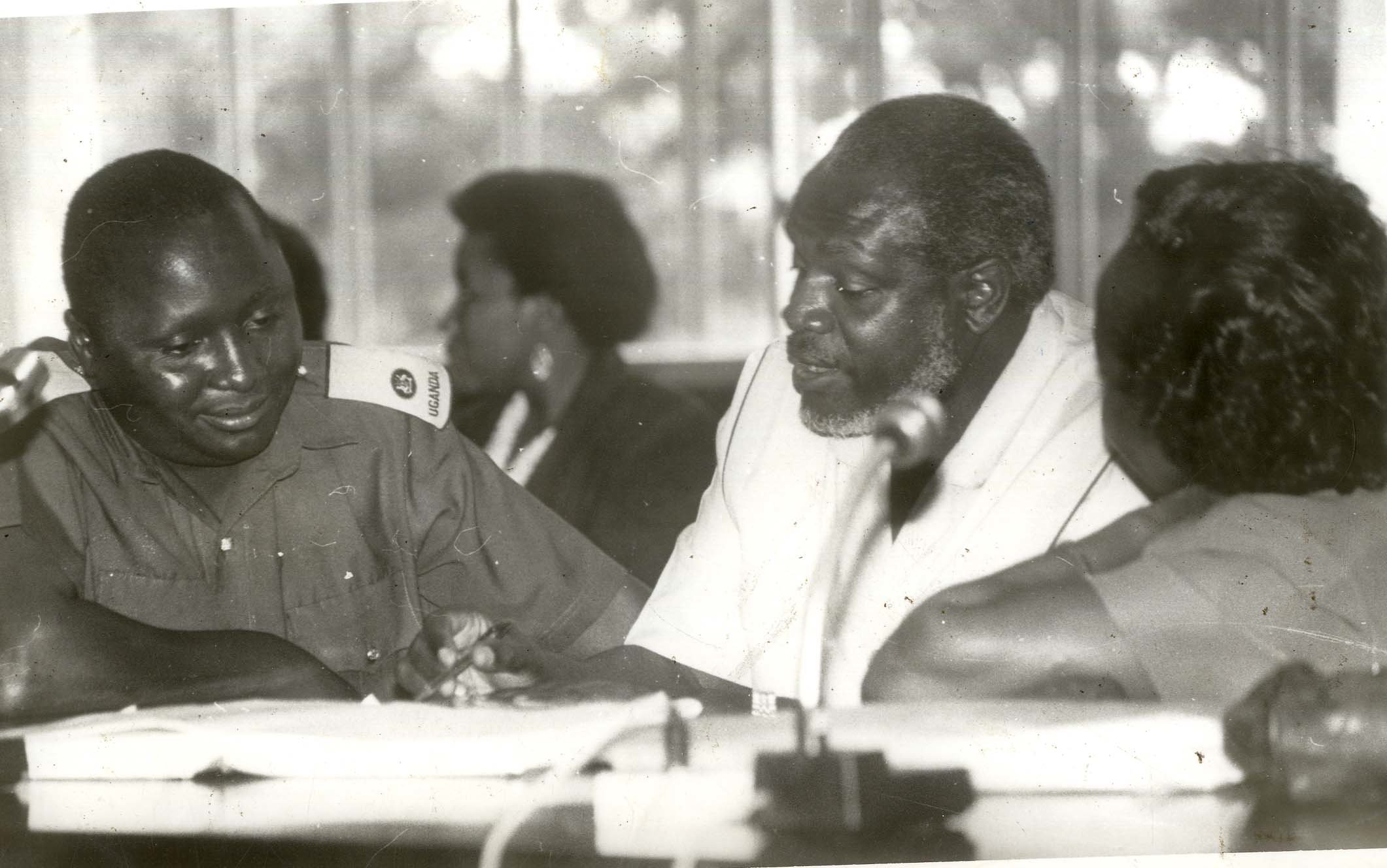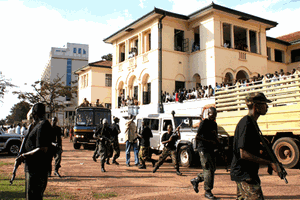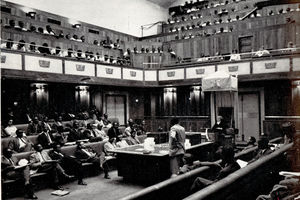
Left to right: Constituent Assembly delegates Maj Gyagenda Kibirango (NRA) and Jack Sabiiti (Rukiga). PHOTO/ FILE
Twenty-nine years ago on Thursday (June 20, 1995), proponents of multiparty democracy lost the vote in the Constituent Assembly (CA) against the enshrinement of the Movement political system in the 1995 Constitution.
The group, working under what was known as the National Caucus for Democracy, which had Prof Dani Wadada Nabudere as secretary general, was also opposed to proposals to use periodic referenda as a means through which political systems could be changed.
Monitor, then a tri-weekly newspaper that was coming out on Mondays, Wednesdays and Fridays, was at hand to cover proceedings in the CA.
According to the Wednesday Monitor edition of June 21, 1995, the vote which was taken at 7.30pm after eight hours of nonstop debate, was the climax of four days of debate.
The debate
The stage for what is arguably one of the most charged debates at the time was set when the president general of the Democratic Party (DP), Paul Kawanga Ssemogerere, and the assistant secretary general of the Uganda Peoples Congress (UPC), Cecilia Atim Ogwal, tabled a motion that sought to have Article 94 deleted from the draft Constitution.
During the debate that ensued, Mr Ben Wacha (Oyam North) supported the amendment, saying the CA was supposed to enact the supreme law of the land and “not engage in drafting the political manifesto of any political organisation”.
Sam Njuba (Kyadondo East) supported the amendment and said his fears of entrenching the Movement were because the Movement he knew for 14 years had changed.
“Today, the Movement has fallen short of all [its former] points. It is an exclusive club, it is seeking permanence [yet it was supposed to be interim], no longer believes in open discussion. I would like to add that it is arrogant, discriminative and today the Movement is sectarian,” Njuba said.
Mr Joseph Mulenga (DP) supported the amendment and said he was “not impressed or even moved” by those continuing to attack the alleged DP/UPC alliance. He urged delegates to listen to ideas and choose the best and warned them against working with “day-to-day political considerations which are subject to change”.
Dick Nyai (Ayivu) supported the amendment because, he said, the National Resistance Army/ Movement (NRA/M) was like any other political organisation.
“The only difference is that its members don’t pay annual subscription. They insist that the taxpayers can pay that. The other difference is that NRM has a military wing, the NRA, to which it is subservient,” he said.
Mr Patrick Mwondha (Bukooli North) supported the deletion.
“Article 94 makes the Movement some kind of monster, which when it is in town, all of us must evacuate,” Mr Mwondha argued.
Brig (Rtd) Matayo Kyaligonza (Buhaguzi) opposed and attacked most of the delegates for being insincere and hypocritical.
“Who would you be to abuse a whole Lt Gen, a Brigadier [in those multi-party regimes?] Today you are abusing them. This is democracy you are enjoying,” Brig Kyaligonza argued.
Medi Kaggwa (Kawempe South) opposed the amendment and argued that rights are not absolute.
He cited examples of organisations like the Ku Klux Klan in the “great country,” the United States which “can’t do what they want because they are misusing the freedom”.
Amanya Mushega (Igara East), who opposed the amendment, did not restrain himself in his attack of the UPC.
“It is foolish people who refuse to take the lessons of history who repeat the mistakes of the past,” Mr Mushega argued.
Outcome
Some 199 delegates voted in favour of continuation of “no party rule”, 68 against it while two, notably delegates of the NRA, later Uganda Peoples’ Defence Forces (UPDF) – Gen David Tinyefuza, now Sejusa, and Lt Col Serwanga Lwanga – abstained.
Prof Apollo Nsibambi, who was to later serve as a Cabinet minister and later prime minister, Mr Owiny-Dollo, who was to later become a judge and is now the Chief Justice, Mr John Eresu (Kaberamaido) and Mr David Mwaka (Nwoya) were among those who voted in favour of deletion.
The movers did not have either two thirds to win outright or one half of all members voting to make the matter contentious.
“Hon members, the motion is lost so now we go back to the original text of Article 94 in the draft, and all the other amendments that are still there,” chairman of CA, Mr James Wapakhabulo, declared.
Protesting
No sooner had he made the declaration than Mr Joseph Mulenga, one of the DP delegates to the Assembly, rose to make what was to be a brief, but earth moving statement. The statement was to protest the apparent failure by the supporters of multiparty democracy to be more accommodative of other people’s views.
“In view of what has transpired, I want to say that on behalf of the National Caucus for Democracy, we don’t intend to deliberate in this exercise any much further,” Mr Mulenga said.
According to the Monitor edition, Mulenga told the Assembly that two attempts had been made to hammer out a compromise between the Movement supporters and proponents of multiparty democracy, but that it had always been clear that the Movementists were unwilling to compromise.
“Just this afternoon, Mr chairman, you tried to call a small break for a compromise, but as you know, the members resisted your suggestion,” Mr Mulenga told the Assembly.
He, in a surprising move, announced that the proponents of multiparty democracy had elected to leave the Assembly and would not be party to further discussions on the said Chapter 94 as they did not want to be part of a debate that sought to “entrench the Movement”.
“The debate and any other decisions that’s taken will have to be taken without our (proponents for multiparty democracy) participation,” Mr Mulenga added.
He said they would, however, return to finish the Constitution and for the reconsideration stage.
The walkout
No sooner had Mr Mulenga finished his submission than all those who had voted to have Article 94 deleted – except Nsibambi, Owiny-Dollo, Eresu and Mwaka – stormed out to a rousing welcome by multiparty supporters who were gathered in the lounge of the Serena Conference Centre where some of them were hoisted in the air.
Mwaka said he had not walked out because “the people of Nwoya asked me not to walk out, but to stay and talk”.
Eresu also explained that he had not walked out because he thought there was still some hope of a compromise of sorts. He, however, concluded that the two parties had lost track.
Criticism
Inside the Assembly, minister Bidandi Ssali rose to describe the walkout as “unfortunate”. He accused those who had walked out of betrayal, saying whereas they had been voted to represent the people in the CA, they were walking out of the Assembly on the orders of the National Caucus for Democracy.
“What has happened now is what they planned all along,” Mr Bidandi Ssali said.
The chairman sought to wash himself clean of any blame for how things had panned out.
“I have done my job and as far as I am concerned, debate continues tomorrow,” Mr Wapakhabulo declared before adjourning proceedings to the following day.
That debate paved way for the inclusion in the 1995 Constitution of Article 269, which barred parties from engaging in “any activities that may interfere with the Movement political system”. They could not operate branches, hold public rallies or sponsor candidates for public office.








